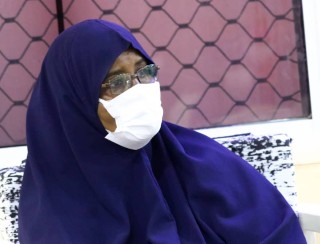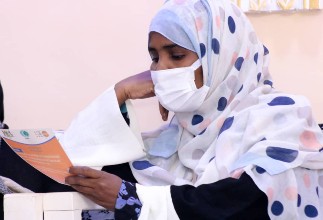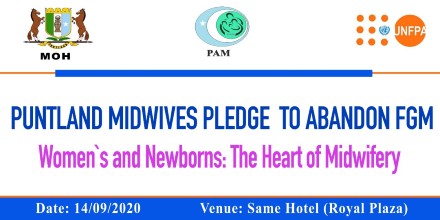Falastin Said, from Garowe, Puntland, has practised as a midwife for 30 years. She serves as a board member of the Puntland Association of Midwives (PAM), a professional association in Puntland established by midwives to promote and enhance the expansion, performance and the midwifery profession by promoting and adhering to the midwifery code of ethics and empowering professional midwives to reduce maternal, newborn and child morbidity.
Ms. Said has a major concern; she says more and more midwives, including herself, are facing pressure from some members in the community who keep on asking them to perform female genital mutilation (FGM) on girls.
‘FGM is a deeply rooted cultural practice in Somalia, and my community isn’t spared. Families are now seeking medicalization of FGM as the campaign on ending FGM is getting stronger,” says Ms. Said. Medicalization of FGM refers to the practice being carried out by any category of health care provider, whether in a public or a private clinic, at home or elsewhere. It also includes the procedure of infibulation at any point in time in a woman’s life.

Ms. Said at the gathering of midwives in Puntland
UNFPA indicates that FGM can never be “safe,” and there is no medical justification for the practice. Even when the procedure is performed in a sterile environment by a health care provider, there is a risk of health consequences immediately and later in life. Under any circumstances, FGM violates the right to health, the right to be free from violence, the right to life and physical integrity, the right to non-discrimination, and the right to be free from cruel, inhuman or degrading treatment.
Somalia is one of the countries in the world with the highest prevalence of FGM. The recently-launched Somali Health and Demographic Survey (SHDS) indicates a prevalence of 99 percent among women and girls aged 15 to 49 years. Somalia continues to lack a critical legislative framework to end FGM due to weak political will and the lack of consensus among key religious groups for zero tolerance for FGM.
Recently, media reports have also revealed that the school closures during the COVID-19 epidemic have exposed girls to an inordinately high risk of FGM. The lockdown has been seen as an opportune time for the procedure to be carried out in the home with ample time for healing. Also, increased economic hardship as a result of COVID19 encourages FGM traditional practitioners to seek out clientele by knocking door-to-door to cut girls.
UNFPA Somalia Midwifery Specialist Ms. Hawa Abdullahi Elmi says more investment is needed in the midwifery profession, particularly in midwifery regulation where the practice can be more regulated to ensure that no midwife performs any medicalization of FGM.
“Midwifery leadership and advocacy capacity need to be strengthened so that advocacy and behaviour change communication for midwives and midwifery associations equips them with the information and skills necessary to be active participants in FGM prevention, including being role models, counsellors and as advocates for change at the community level,” said Ms. Elmi.

Ms. Hawa Elmi
She said it is vital for FGM care and prevention to be integrated into routine care including prenatal and post-natal services and strengthen management information systems on FGM including registration, follow up, tracking and data collection and implement FGM reporting and registration procedures at hospitals, clinics and community level.
“We’re therefore pleased that over 100 midwives in Puntland, including 20 new graduates from UNFPA-supported midwifery schools, on 14 September 2020 committed not to participate in medicalization FGM. They pledged to be anti-FGM champions in the EndFGM campaign following an assembly organized by the Puntland Ministry of Health and PAM with UNFPA’s financial and technical support,” says Ms. Elmi.
Ms. Fatima Mahamud, another well-experienced midwife, also based in Garowe says midwives must play a significant role in the general prevention of FGM and even in managing complications from FGM through advocacy and early screening of antenatal mothers and identifying those women for a referral to ensure access to essential services, so they do not turn up in labour needing defibulation.
“There is a need to strengthen the capacity of midwives on FGM prevention and care to empower them to resist this growing pressure of participating in the medicalization of FGM,” says Ms. Mahamud.

As frontline health workers, midwives have unique knowledge about the practices and social dynamics within the community and can identify who is performing FGM and when and where it occurs, according to UNFPA’s toolkit titled “Engaging Midwives in the Global Campaign to End Female Genital Mutilation". The toolkit indicates that as trusted community members, midwives are essential advocates for sexual and reproductive health issues in the communities they serve and can play a critical role in the abandonment of female genital mutilation.
Midwives can serve as advocates for the abandonment of female genital mutilation in their communities by providing information on the devastating consequences of the practice and the benefits of abandoning the practice. As counsellors and care providers on sexual and reproductive health in their communities and can help prevent the practice of FGM by sensitizing women and their families on the consequences of female genital mutilation and re-infibulation, including health risks and human rights violations.
By pledging never to perform female genital mutilation or re-infibulation and never to cut or re-infibulate their daughters and granddaughters, midwives can help prevent FGM. Furthermore, Midwives detect complications that are a result of FGM and provide care when possible. If a midwife is not able to provide care for a complication, the woman should be referred to other care services to prevent the development of complications associated with the practice.

Midwives and UNFPA staff at the meeting with PAM
FGM entails all procedures which involve the partial or total removal of the external genitalia or injury to the female genital organs, whether for cultural or any other non-therapeutic reasons. WHO estimated in 2015 that 100-140 million girls and women have experienced FGM, and at least 3 million girls undergo some kind of procedure every year.
In Somalia, 99 percent of Somali women have undergone any one of the three types of FGM/C. Type III/Pharaonic FGM/C is the most common type, which has been performed on 64 percent of the women who have undergone FGM. 12 percent of the women have undergone the intermediate type, which involves the sewing and closing of the genital area. In comparison, 22 percent have undergone the Sunni type, which involves partial or total removal of the clitoris and/or its prepuce.
FGM exposes women of reproductive age to a lot of risks and complications which could be immediate or long term. There are also obstetric complications which include; difficulty in undertaking vaginal examinations, prolonged and obstructed labour which lead to perineal tears/episiotomy, haemorrhage, fistula formation, uterine inertia, rupture or prolapse and stillbirth and early neonatal death among others. Some women may also experience psychological complications which include; Post-traumatic stress disorder (PTSD), anxiety disorders and depression.
----Pilirani Semu-Banda


